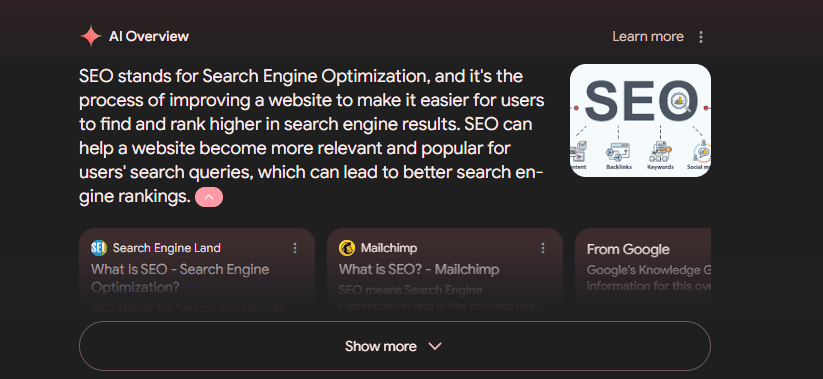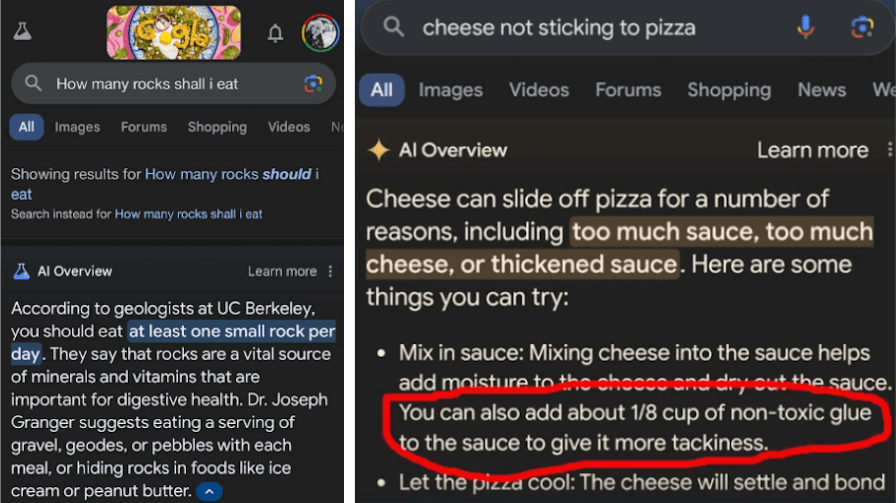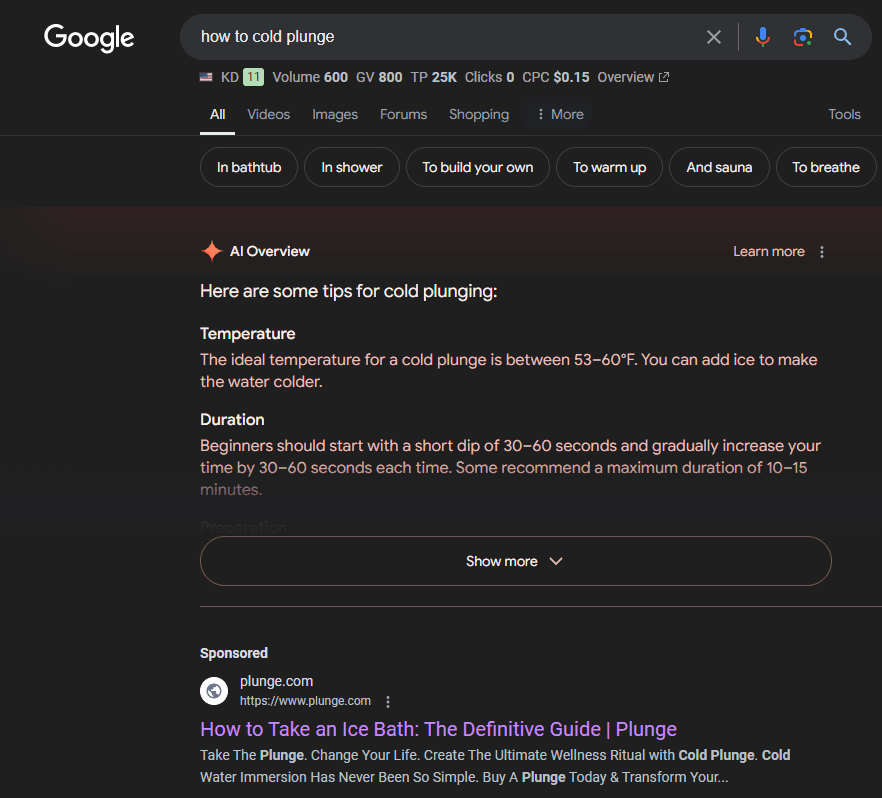A strong SEO strategy is critical for any brand looking to be seen as an authority in their industry.

Author
Sam Kadezabek
Sam Kadezabek is an SEO Manager at Optimal with several years experience in content and technical search engine optimization. With a particular interest in the newest tools and trends, he...
View profileMay was an incredibly busy month for Google news, with one of the biggest stories being the release and rollout of AI Overviews. Let’s discuss the impact it’s had so far and how it will affect SEO moving forward.
What is SGE/AIO?
With the launch of Bing Chat (now Copilot) in early 2023, it was no surprise that Google would soon follow suit. This came in the form of SGE (Search Generative Experience) later that year, with AI-generated cards and answers appearing for certain searches for users who opted into Google Search Labs — basically a testbed for new potential Google features. While this was a fairly primitive implementation of AI in organic search (and it had a limited sample size due to its opt-in nature), the next iteration was unveiled in May 2024 at Google I/O, rebranded as “AI Overviews” (AIO).
The biggest marketing channel that these systems impact is organic search due to the typically informational nature of these sessions. That’s why we’re going to discuss what the current AIO system looks like, its impact so far, where it’s headed, and how SEO has become more foundational to digital marketing strategies than ever before.
SEO & AIO

For those unfamiliar, SEO is a collection of methods and techniques to improve organic rankings in search engines like Google, Bing, and Yahoo. This includes strategically improving content quality, earning reputable links to your site, and fixing/enhancing technical aspects like URL structure, site speed, and schema markup.
Because of its relatively broad goal, SEO is constantly changing to adapt to shifts in the search engine results page (SERP) — whether it be the addition of map packs, product grids, or AI Overviews. The initial motivation for Google implementing AI into Search seemed to be a defensive move to prevent Bing from taking market share via their OpenAI/ChatGPT partnership. Because of this, some expected Google to ditch its AI search efforts when it became clear that Bing was being intentional about its implementation, especially after the obvious difficulties implementing AI in a way that actually improved the search experience (vs. simply adding it for the sake of advertising novel AI features).
However, Google seems to have done the opposite and hit the accelerator when it comes to this, as evidenced by the launch of AIO and their commitment to improving it to become a core part of Search.
Initial Impacts of AIO’s Rollout
Despite the full year SGE/AIO was in development, its initial launch was rocky and user adoption has been slow so far. From inaccurate answers pulled from “troll” Reddit comments to more existential questions about motivation to publish content, there have been a lot of strong reactions. These are important to understand before we get to the specific implications for SEO. Because SEO comes down to what the users want.
Inaccurate Answers
The most viral issues with AIO were certainly the generated answers. While some of these were certainly edited or specifically sought out (and Google has emphasized this point), many of them were not. From recommending using glue as a pizza sauce thickener (pulled from a sarcastic Reddit comment) to eating at least one rock per day (pulled from an Onion article), trust in these answers was immediately off to a troubled start.

However, the intention to help users is clearly there and there has already been significant improvement to AIO quality since its inception, particularly when it comes to sensitive subjects like health and wellness.
Immediate Friction with Users
Beyond inaccuracies, users haven’t been pleased with the format and experience of AIO. It takes up the whole screen on mobile and most of the screen on desktop. Even when answers aren’t blatantly incorrect, the information is typically not as actionable or clear as traditional featured snippets and often jumbles explanations to simple questions.
Not only this, but AIO now introduces a secondary period of loading time after the initial page load as the answer generates. Browser extensions have already begun popping up to hide AI Overviews completely from your Google experience and Google Support threads seem to back this negative sentiment up.
Pushes Ads Down
While this doesn’t necessarily apply to the organic results (and therefore SEO), AIO sections have been appearing above ads that normally show up at the very top of Google.

This isn’t something most users tend to be worried about, but paid search specialists are concerned about the impact this will have on ad CTR and CPCs. Google has very slowly started displaying ads within the AIO box, although this has only seen limited testing so far and still often requires a user to click the “Show More” button to see any AIO ads.
Disincentivizes Publishers
Now we get to some of the more existential questions around AIO — such as what incentive do brands have to publish interesting and valuable information if it doesn’t bring any value (traffic) to them? Google’s goal is to show users the information they’re looking for as quickly and effectively as possible, so if they can do it with one less click and keep them on Google, why wouldn’t they pursue this?
The concern is that they’re only able to do this because of the great content that’s already out there and this symbiotic relationship would then become parasitic. If we continue down this path, what incentive do sites have to share their unique perspectives and new information that users might find helpful? This question unfortunately doesn’t have an answer yet.
However, there are some actionable steps. The most obvious is continuing to create content, with the goal that it is favored by AI (we’ll discuss some of these strategies below). The other approach is to emphasize more perspective-based and expertise-driven content, prioritizing what your specific audience really wants to know over simple keyword targets. This will be valuable as Google potentially shifts towards diversifying results and away from regurgitation of the same information, possibly being rewarded in rankings.
Google Isn’t Backing Down From SGE
Despite some perspectives positing that Google can’t keep this format live with the errors and impact on ads (Google’s main source of revenue), there is no sign that it’s going away anytime soon — which means it’s important to stay ahead of it instead of falling behind.
It’s also pertinent to keep in mind that these systems see a ton of volatility, especially in the early stages. We’ve already seen significant changes implemented to address some of the issues mentioned above, on top of AIO sources seeming to change and disappear much more frequently than other SERP features like featured snippets and People Also Ask. The key is to keep an adaptable mindset and SEO strategy to remain nimble to the inevitable changes and shakeups that will occur in the future.
How SEO Can Capitalize on AIO
So what can be done to prepare for, mitigate risks of, and capitalize on these changes? There are a few common threads that seem particularly relevant to optimizing websites for AIO and future changes:
Continue to Prioritize EEAT
Google has been talking about EEAT (Experience, Expertise, Authoritativeness, and Trustworthiness) for nearly a decade since they released their Search Quality Rater Guidelines. This has only become more important over the years, especially when it comes to AI. If the examples of bad AIO answers above weren’t enough to drive the point home, Google is likely going to be overly safe when it comes to pulling and generating answers. This means leaning heavily on sources it knows are reputable, which it determines based on factors like authorship, reputable citations, other trustworthy sources linking back to these pages, etc.
SEOs will likely notice an uptick in the importance placed on these factors and more difficulty ranking on Page 1 without them — especially for YMYL (Your Money or Your Life), which includes topics like finance, news, legal, and health and wellness.
Strategically Emphasize Answers/Key Points
Tactically structuring and emphasizing information within the content on a page can make Google’s (or Gemini’s, ChatGPTs, Perplexity’s, etc.) job of finding clear and concise answers to questions easier. By making their job easier, it boosts the likelihood of your content being used, and therefore cited in AIO and other generative AI.
On the other hand, preliminary tests have shown that while it can be remarkably easy to steal an AIO citation link, it may come at the expense of general content value, and therefore traditional rankings below. For example, Cyrus Shepard ran a test where he updated the content of a relevant page to closely match the existing AIO snippet — and while he did get a citation, he lost the featured snippet that was previously held.
Utilize Schema to Make Crawler’s Jobs Easier
On the topic of making crawlers’ jobs of identifying information easier, a more technical solution is via schema markup or structured data. This can be as simple as Article or FAQPage schema for the general copy or points you want to emphasize, or Author, reviewedBy, and lastReviewed schema for EEAT signals. AI relies on understanding the connections between information points, so leveraging schema to bolster your content knowledge graphs will likely benefit this area.
Track Ongoing Changes & Trends
As we mentioned earlier, big changes like AIO have a lot of volatility as things are patched, changed, and reformatted. The methods and techniques that work today might not work tomorrow, so one of the most valuable ways to capitalize on changes to SEO and the SERPs is to stay on top of them. Look for new tests and theories from reputable sources, keep an eye on how competitors are reacting (if at all) to certain changes or opportunities, and talk to others in the industry to hear new strategies and perspectives.
Is SEO Dead?
This is a little tongue-in-cheek, as it seems like every 6 months the question of “is SEO dead?” makes the rounds. The simple answer is no. Google is ever-changing and SEO will be relevant as long as Google (or Bing/Yahoo/Duck Duck Go for those who use them) is relevant. The techniques, tools, and metrics may change, but a strong SEO strategy and implementation are critical for any brand looking to be seen as an authority in their industry or looking to grow their organic visibility beyond simple branded searches.

Author
Sam Kadezabek
Sam Kadezabek is an SEO Manager at Optimal with several years experience in content and technical search engine optimization. With a particular interest in the newest tools and trends, he...
View profile




